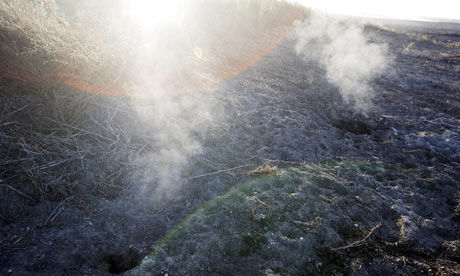Most important inland wetland in Spain consumed by underground fire
National park which was once a ‘paradise’ now on fire and churning out tonnes of CO2 
By Giles Tremlett, Las Tablas de Daimiel, central Spain They are meant to be Spain’s most important inland wetlands, but yesterday the lagoons at Las Tablas de Daimiel national park were not just dry, they were burning. Stilted walkways stood on baked earth and rowing boats lay stranded on the ground. Observation huts revealed no birds, just an endless stretch of reeds rooted in cracked mud. Only 1% of the park’s surface remains wet, but the real catastrophe is happening underground. “If you see smoke it is because the dried-out peat under the ground has begun to self-combust,” a park worker warned visitors. Occasionally, the fire breaks to the surface, sending up puffs of white smoke. Scientists warn the wetlands are losing the lining that once retained water, with deep cracks opening up in the worst areas. Park authorities worry the damage may prove irreversible. Park director Carlos Ruíz believes this is a life-or-death moment for one of Spain’s 14 national parks. “We are at a point of no return,” he said in a recent report. Spain’s environment ministry, which runs the failing park, this week banned Ruiz from talking to the Guardian, but scientists who know the wetlands all agree on what is happening. The aquifer which once fed the lagoons now lies 50ft below them. Farmers near the park have sunk thousands of wells, some 300ft deep, and have spent years pumping out more water than goes in. Furthermore, the Guadiana river, which used to flow into the Tablas de Daimiel, has disappeared. “People have been warning that it was going to dry out for 20 years,” said Luís Moreno of Spain’s Geological and Mining Institute. …
Spanish wetlands shrouded in smoke as overfarming dries out peat